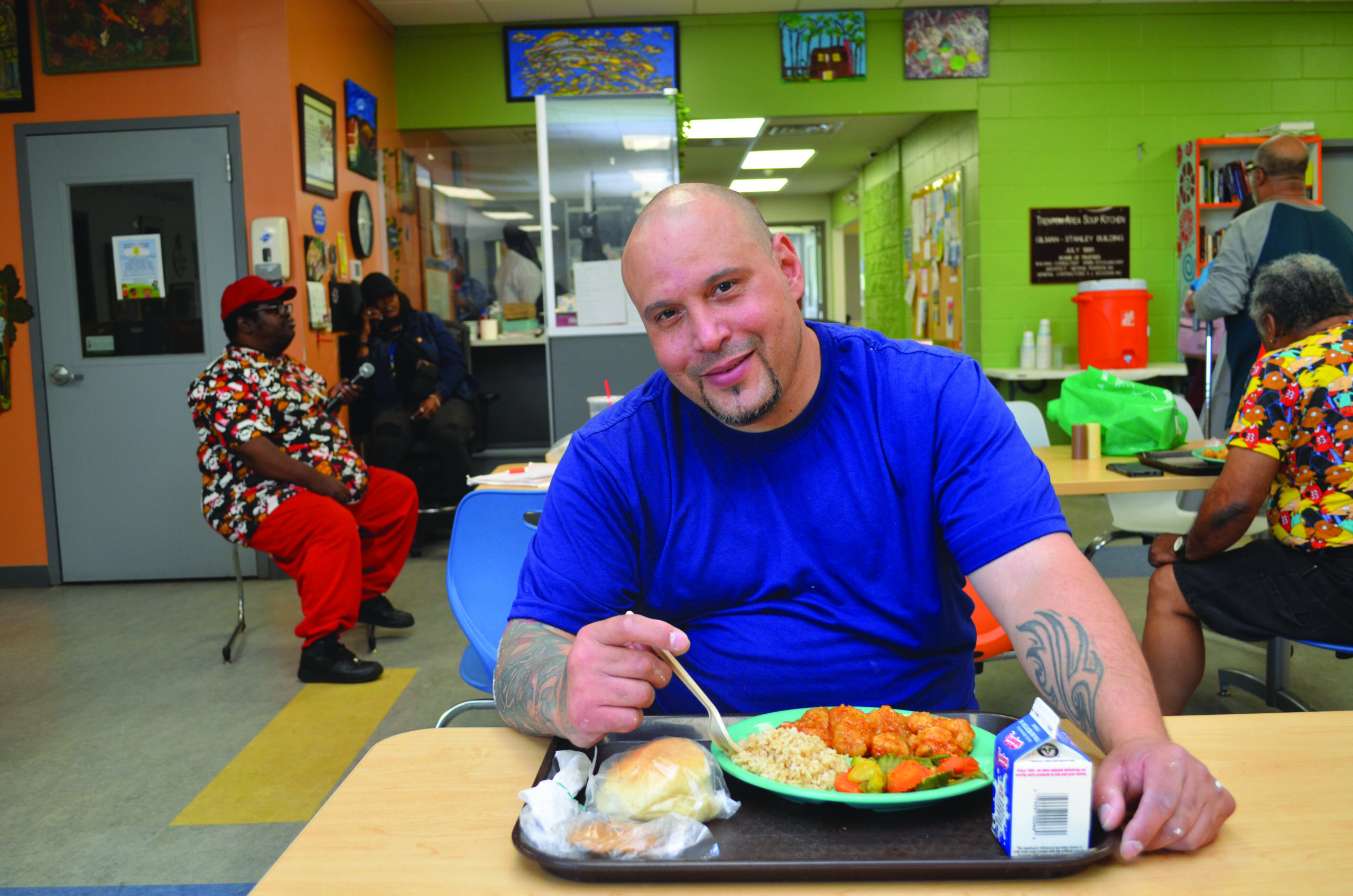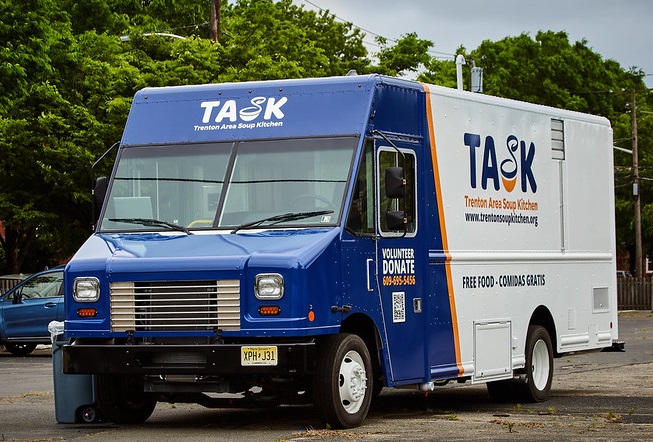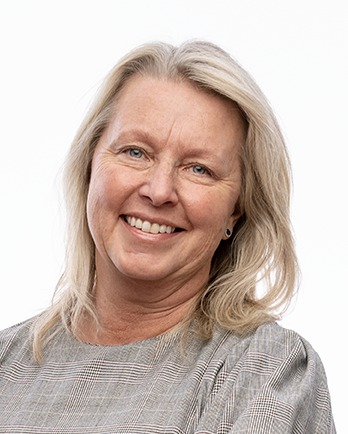News, Events & Stories
TASK is Food First & Much More

At TASK, we often say that hope begins with a meal. Individuals come to us because they are hungry, but they stay because our meals offer a new beginning and the start of a better life.
When changing lives and helping others, collaboration is key. TASK understands that helping individuals live healthy, independent lives cannot be done alone. That’s why we offer wrap-around services to help lift our patrons out of poverty and hunger and put them on the path to self-sufficiency. It’s a model of care and collaboration that’s long been followed by many soup kitchens.
More recently, the success of this holistic approach has inspired food banks across the nation to follow suit.
“For a small but growing number of food banks, distributing food is no longer enough,” announced Food Bank News in a recent issue. “The movement stems from a greater understanding of the challenges facing the food-insecure.”
“People run out of money for food because they are trying to meet other expenses like housing, healthcare, transportation or utilities,” the article continues. “As the most likely entry point for social services, food banks have an opportunity to not only feed clients, but steer them to other types of assistance.”
Joyce Campbell, TASK’s CEO, says she’s not surprised by this new movement. “I think the model of wrap-around services is clearly what people need,” says Campbell. “Major soup kitchens like TASK have adopted a more holistic approach over the years because we’ve listened to our patrons. For them, transportation is a tremendous issue. If somebody is working, trying to take the time to go to different places to access all the things they need – it’s really hard.”
“What our patrons have told us is they want more one-stop social service centers,” Campbell adds. “They want case management, and by case management, I mean they want a coach, someone to show them how to access the benefits and opportunities available to help them move out of poverty.”
“TASK does all of those things,” Campbell emphasizes. “Our case managers bring services to folks. We help them navigate the system. And we do it all in a very dignified environment.”
Life-Transforming Support
“I could have been dead had I not come to TASK,” says Greg Dixon, who first came to TASK 10 years ago. He was homeless for a decade, battled addiction and dealt with numerous physical ailments while living on the street. He washed windows to earn money.
“I would only come here if I was really hungry,” says Dixon.
Later, when he became a regular in our Escher Street dining room, Dixon met Julie Janis, TASK’s Social Services Coordinator. Dixon was one of Janis’ first clients.
“If it was not for her, I doubt I would be here because I didn’t have anybody to hold on to,” Dixon says. “I was sodown. Life was so dark. Nobody important was holding onto me. I was going down the drain. She showed me how doors were available to be opened for me. That’s what made me keep coming back.”
But TASK’s case managers do not work in a vacuum. They are tenacious and collaborate with individuals from other organizations and state agencies to get patrons the help they need. They must pull on multiple strings to help patrons.
“We work with individuals over time, sometimes over periods of years, with different things that come up,” says Janis. “What’s really important is that we collaborate with our agency partners, and we all pull together and work together to help individuals move forward with their lives.”
Janis worked with Trenton’s Department of Health & Human Services, Catholic Charities, Helping Arms and the Community Health Law Project to get Dixon Social Security Disability benefits, a housing voucher and into an apartment. Janis also helped Dixon get to the hospital when he developed a potentially life-threatening infection and required surgery.
“It’s a shared feeling of pride when someone succeeds and finally gets to a place where they are stable. It’s incredibly gratifying,” says Janis.
Sometimes, all it takes is one person to write a new chapter in a patron’s life. For Dixon, it was Janis.
“She is the cause of me being able to see, for being able to have my limb, to have a roof over my head, to eat,” Dixon confides as he and Janis exchange smiles. “I get up, I look around, and I think about how glad I am and how fortunate I am to be in a home.”
A Meal Can Change a Life
Our patrons have different reasons for walking into TASK. Eating a hot, nutritious meal. Finding a job. Obtaining identification. Securing a permanent place to live. Whatever their reasons are, that first step towards self-sufficiency often begins in our Escher Street dining room.
Efraín Calvente first came to TASK in 2007 for our meal service, where he learned that we help individuals with a variety of seemingly insurmountable challenges.
Calvente had ended a relationship with a partner who was abusing drugs. A recovering addict who didn’t want to use drugs again, Calvente left his home and found shelter at the Trenton Rescue Mission. Each day, he’d come to TASK for a meal, which is where he met TASK Patron Services Specialist Evie Spadafora. Calvente told her that he needed an apartment.
That conversation changed Calvente’s life.
Spadafora directed him to an apartment complex near TASK, and one of our case managers helped him apply for the housing. We also helped him get a copy of his birth certificate, which enabled him to find employment.
Now, Calvente has a job cleaning his apartment building and another in Trenton. Besides scouring the communal bathrooms and kitchens, Calvente paints, remodels, repairs, cleans, and prepares vacated apartments for inspectors. On weekdays, he walks to TASK during his breaks for coffee and takes a meal or salad to-go.
“TASK has helped me so much, especially with food,” Calvente says.
Helping our patrons gain stability is often a long and complex process. Spadafora notes that it took two years just to obtain Calvente’s birth certificate from Puerto Rico.
“Our patrons must be patient,” she says. “More often than not, there is no easy fix. But treating everyone with compassion and kindness helps bridge the gap between their frustration and the exhilaration of getting what they need. That part is really heartwarming.”



